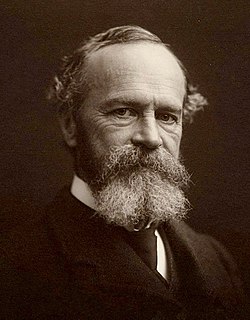William James Quote
The greatest discovery of our generation is that human beings can alter their lives by altering their attitudes of mind. As you think, so shall you be.
William James
The greatest discovery of our generation is that human beings can alter their lives by altering their attitudes of mind. As you think, so shall you be.
Tags:
discovery, generation
Related Quotes
Heresy would like to think of itself as 'invented Truth'. But of course, all Reason and Logic would agree that no man can ever create Truth; he can only discover it. If heresy were ever at all benefic...
Criss Jami
Tags:
answers, apologetics, argumentation, beliefs, church, create, deceit, definition, discovery, doctrine
You know that feeling of invincibility you sometimes get, especially when young and testing yourself - well that could be because actually know deep down that we are indeed eternal. We come into this...
Jay Woodman
Tags:
art, balancing, being, blissful, celebrating, companion, connection, craft, creating, dedication
This theory [the oxygen theory] is not as I have heard it described, that of the French chemists, it is mine (elle est la mienne); it is a property which I claim from my contemporaries and from poster...
Antoine Lavoisier
Tags:
chemistry, discovery, french, invention, oxygen theory, posterity, science, scientific theory, scientist, theory
The world is changing rapidly, and everyone changes along with the world. Discoveries is now becoming rampant; intellectually, technologically,etc, each having its advantage and disadvantage.
Michael Bassey Johnson
Tags:
advantage, age, bearing fruits, change, changing, computer, computer age, computers, creative, creativity
About William James
William James (January 11, 1842 – August 26, 1910) was an American philosopher and psychologist. The first educator to offer a psychology course in the United States, he is considered to be one of the leading thinkers of the late 19th century, one of the most influential philosophers and is often dubbed the "father of American psychology."
Born into a wealthy family, James was the son of the Swedenborgian theologian Henry James Sr. and the brother of both the prominent novelist Henry James and the diarist Alice James. James trained as a physician and taught anatomy at Harvard, but never practiced medicine. Instead, he pursued his interests in psychology and then philosophy. He wrote widely on many topics, including epistemology, education, metaphysics, psychology, religion, and mysticism. Among his most influential books are The Principles of Psychology, a groundbreaking text in the field of psychology; Essays in Radical Empiricism, an important text in philosophy; and The Varieties of Religious Experience, an investigation of different forms of religious experience, including theories on mind-cure.
Along with Charles Sanders Peirce, James established the philosophical school known as pragmatism, and is also cited as one of the founders of functional psychology. A Review of General Psychology analysis, published in 2002, ranked James as the 14th most eminent psychologist of the 20th century. A survey published in American Psychologist in 1991 ranked James's reputation in second place, after Wilhelm Wundt, who is widely regarded as the founder of experimental psychology. James also developed the philosophical perspective known as radical empiricism. James's work has influenced philosophers and academics such as Alan Watts, W. E. B. Du Bois, Edmund Husserl, Bertrand Russell, Ludwig Wittgenstein, Hilary Putnam, and Richard Rorty.
Born into a wealthy family, James was the son of the Swedenborgian theologian Henry James Sr. and the brother of both the prominent novelist Henry James and the diarist Alice James. James trained as a physician and taught anatomy at Harvard, but never practiced medicine. Instead, he pursued his interests in psychology and then philosophy. He wrote widely on many topics, including epistemology, education, metaphysics, psychology, religion, and mysticism. Among his most influential books are The Principles of Psychology, a groundbreaking text in the field of psychology; Essays in Radical Empiricism, an important text in philosophy; and The Varieties of Religious Experience, an investigation of different forms of religious experience, including theories on mind-cure.
Along with Charles Sanders Peirce, James established the philosophical school known as pragmatism, and is also cited as one of the founders of functional psychology. A Review of General Psychology analysis, published in 2002, ranked James as the 14th most eminent psychologist of the 20th century. A survey published in American Psychologist in 1991 ranked James's reputation in second place, after Wilhelm Wundt, who is widely regarded as the founder of experimental psychology. James also developed the philosophical perspective known as radical empiricism. James's work has influenced philosophers and academics such as Alan Watts, W. E. B. Du Bois, Edmund Husserl, Bertrand Russell, Ludwig Wittgenstein, Hilary Putnam, and Richard Rorty.
